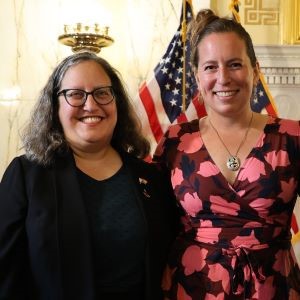 |
|
5/2/2024
|
Op-Ed: Building emissions are a threat and an opportunity for Rhode Island
|
 By Sen. Meghan E. Kallman and Rep. Rebecca Kislak By Sen. Meghan E. Kallman and Rep. Rebecca Kislak
Almost one third of Rhode Island’s carbon emissions come from heating and cooling our buildings. And yet, we currently have no plan on the books to systematically reduce these emissions, as mandated by the Act on Climate. Reducing building emissions both addresses the climate emergency, and is an opportunity for cost savings and economic growth.
To meet our mandates and build a climate resilient state, we must reduce emissions from both existing buildings and new construction. The Building Decarbonization Act (2024-S 2952, 2024-H 7617) sets us up to do just that with two main sections. The first section benchmarks energy use and emissions of our large buildings, and subsequently develops standards to reduce these emissions in alignment with our Act on Climate mandate. The aim of this section is to reduce greenhouse gas emissions from Rhode Island’s largest buildings and save building owners and the state money.
To decarbonize buildings, we first have to measure the energy use and emissions of our biggest ones. Baseline data is very important, because if we don’t know how our buildings are performing – and right now we don’t! – we can’t start making them more efficient. The data collected will give the Office of Energy Resources the information it needs to develop a standard and reduce emissions. The state will then lead the way by applying these benchmarking procedures to its own large buildings, before those standards are applied to privately-owned buildings. By identifying energy waste and reducing energy costs, this systematic benchmarking will not only reduce carbon emissions but save building owners, including the state, money on heating and cooling costs.
The second step will be to electrify. Section two phases in requirements for all-electric new construction, starting with public buildings first, while also giving our cities and towns the authority to require all electric construction on a faster timeline if they so choose. We’re making progress in Rhode Island to reduce the greenhouse gas emissions from our state’s electrical usage. But since more than 54% of homes in Rhode Island use natural gas and 30% more use oil to heat their homes, we won’t realize the benefits of a greener electrical grid unless we electrify our buildings.
All-electric new construction stops us from digging a deeper hole. The Act on Climate requires 45% emissions reduction by 2030 - it doesn’t make sense to be installing fossil fuel equipment that is designed to last 20 years, bringing us further and further away from an emissions target that is now only six years away. Thankfully, all-electric new construction has reached cost parity with fossil fuel construction. All-electric buildings are also better for our health: According to a Stanford study, poor air quality resulting from burning fossil fuels is linked to increased rates of disease and mortality.
The Act on Climate requires statewide emissions to drop to net-zero by 2050, but since 70% of our 2050 building stock has already been built, meeting this goal will require us to extensively retrofit existing buildings. This investment in our infrastructure will also be an investment in Rhode Island’s green economy, creating thousands of good, local jobs that are sustainable in every sense of the word. A study in Maryland showed that clean energy jobs pay more than statewide averages, especially in entry-level positions that are the backbone of economic growth.
Too often, lower-income and historically marginalized communities disproportionally bear the costs of large infrastructure improvements, which is why we also call for the establishment of an environmental justice advisory board to ensure the implementation of this plan benefit disadvantaged communities in addition to a percentage of income cap on the cost of electricity for low- and moderate-income Rhode Islanders in all-electric buildings, to keep electrical prices affordable during our transition to a sustainable, electrically powered Rhode Island.
We urge our colleagues and neighbors to join the over 40 local and state governments who have already started to design and implement green building performance. This strong investment in our state’s infrastructure will meet the climate needs of the moment while building the economy of the future.
Sen. Meghan E. Kallman (D-Dist. 15, Pawtucket, Providence) and Rep. Rebecca Kislak (D-Dist. 4, Providence) are the sponsors of the Building Decarbonization Act.
IN PHOTO: From left, Rep. Rebecca Kislak and Sen. Meghan E. Kallman.
For more information, contact:
Tristan Grau, Publicist
State House Room B20
Providence, RI 02903
401.222.4935
|
|